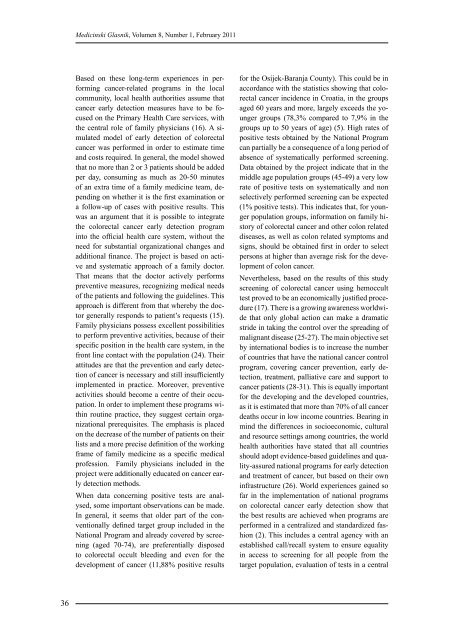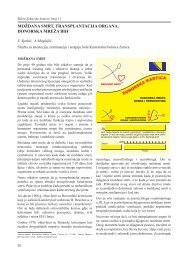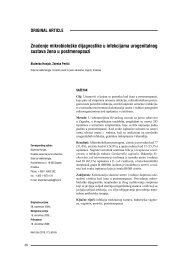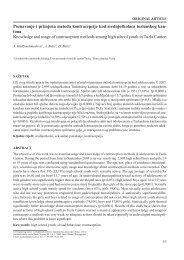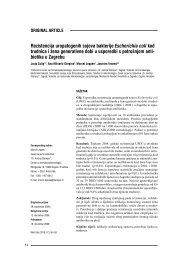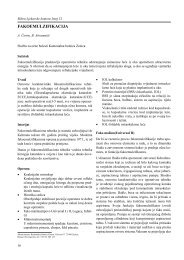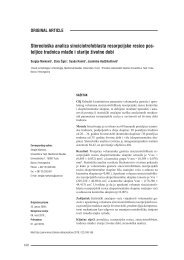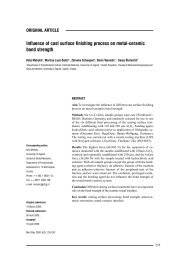MEDICINSKI GLASNIK - Aktuelno Ljekarska komora ZE - DO kantona
MEDICINSKI GLASNIK - Aktuelno Ljekarska komora ZE - DO kantona
MEDICINSKI GLASNIK - Aktuelno Ljekarska komora ZE - DO kantona
You also want an ePaper? Increase the reach of your titles
YUMPU automatically turns print PDFs into web optimized ePapers that Google loves.
36<br />
Medicinski Glasnik, Volumen 8, Number 1, February 2011<br />
Based on these long-term experiences in performing<br />
cancer-related programs in the local<br />
community, local health authorities assume that<br />
cancer early detection measures have to be focused<br />
on the Primary Health Care services, with<br />
the central role of family physicians (16). A simulated<br />
model of early detection of colorectal<br />
cancer was performed in order to estimate time<br />
and costs required. In general, the model showed<br />
that no more than 2 or 3 patients should be added<br />
per day, consuming as much as 20-50 minutes<br />
of an extra time of a family medicine team, depending<br />
on whether it is the first examination or<br />
a follow-up of cases with positive results. This<br />
was an argument that it is possible to integrate<br />
the colorectal cancer early detection program<br />
into the official health care system, without the<br />
need for substantial organizational changes and<br />
additional finance. The project is based on active<br />
and systematic approach of a family doctor.<br />
That means that the doctor actively performs<br />
preventive measures, recognizing medical needs<br />
of the patients and following the guidelines. This<br />
approach is different from that whereby the doctor<br />
generally responds to patient’s requests (15).<br />
Family physicians possess excellent possibilities<br />
to perform preventive activities, because of their<br />
specific position in the health care system, in the<br />
front line contact with the population (24). Their<br />
attitudes are that the prevention and early detection<br />
of cancer is necessary and still insufficiently<br />
implemented in practice. Moreover, preventive<br />
activities should become a centre of their occupation.<br />
In order to implement these programs within<br />
routine practice, they suggest certain organizational<br />
prerequisites. The emphasis is placed<br />
on the decrease of the number of patients on their<br />
lists and a more precise definition of the working<br />
frame of family medicine as a specific medical<br />
profession. Family physicians included in the<br />
project were additionally educated on cancer early<br />
detection methods.<br />
When data concerning positive tests are analysed,<br />
some important observations can be made.<br />
In general, it seems that older part of the conventionally<br />
defined target group included in the<br />
National Program and already covered by screening<br />
(aged 70-74), are preferentially disposed<br />
to colorectal occult bleeding and even for the<br />
development of cancer (11,88% positive results<br />
for the Osijek-Baranja County). This could be in<br />
accordance with the statistics showing that colorectal<br />
cancer incidence in Croatia, in the groups<br />
aged 60 years and more, largely exceeds the younger<br />
groups (78,3% compared to 7,9% in the<br />
groups up to 50 years of age) (5). High rates of<br />
positive tests obtained by the National Program<br />
can partially be a consequence of a long period of<br />
absence of systematically performed screening.<br />
Data obtained by the project indicate that in the<br />
middle age population groups (45-49) a very low<br />
rate of positive tests on systematically and non<br />
selectively performed screening can be expected<br />
(1% positive tests). This indicates that, for younger<br />
population groups, information on family history<br />
of colorectal cancer and other colon related<br />
diseases, as well as colon related symptoms and<br />
signs, should be obtained first in order to select<br />
persons at higher than average risk for the development<br />
of colon cancer.<br />
Nevertheless, based on the results of this study<br />
screening of colorectal cancer using hemoccult<br />
test proved to be an economically justified procedure<br />
(17). There is a growing awareness worldwide<br />
that only global action can make a dramatic<br />
stride in taking the control over the spreading of<br />
malignant disease (25-27). The main objective set<br />
by international bodies is to increase the number<br />
of countries that have the national cancer control<br />
program, covering cancer prevention, early detection,<br />
treatment, palliative care and support to<br />
cancer patients (28-31). This is equally important<br />
for the developing and the developed countries,<br />
as it is estimated that more than 70% of all cancer<br />
deaths occur in low income countries. Bearing in<br />
mind the differences in socioeconomic, cultural<br />
and resource settings among countries, the world<br />
health authorities have stated that all countries<br />
should adopt evidence-based guidelines and quality-assured<br />
national programs for early detection<br />
and treatment of cancer, but based on their own<br />
infrastructure (26). World experiences gained so<br />
far in the implementation of national programs<br />
on colorectal cancer early detection show that<br />
the best results are achieved when programs are<br />
performed in a centralized and standardized fashion<br />
(2). This includes a central agency with an<br />
established call/recall system to ensure equality<br />
in access to screening for all people from the<br />
target population, evaluation of tests in a central


